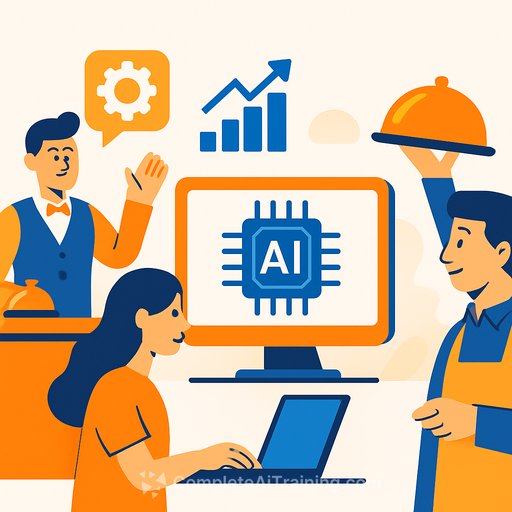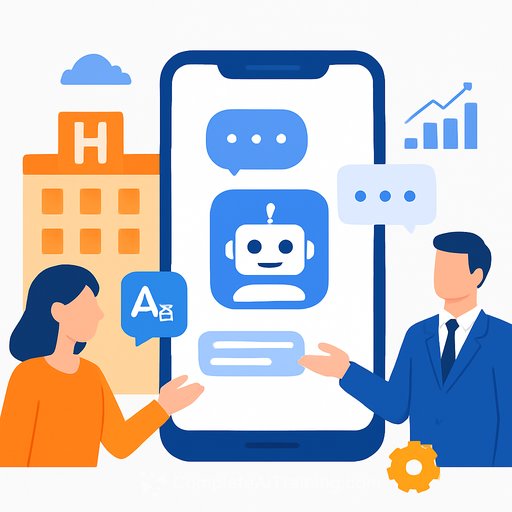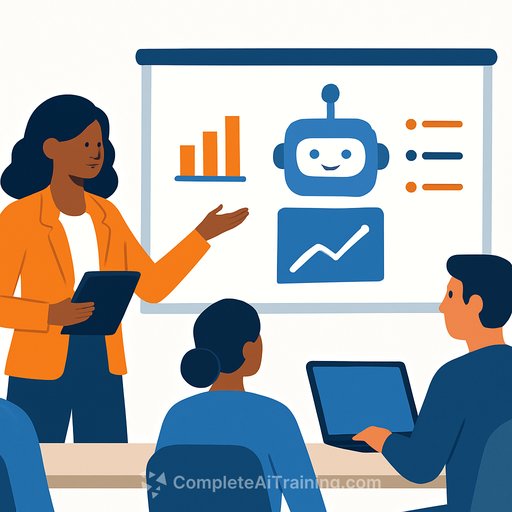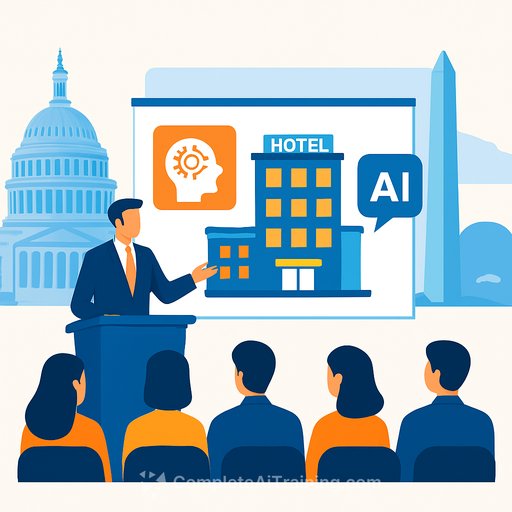How AI Is Helping Hospitality Companies in Sacramento Cut Costs and Improve Efficiency
Quick overview: Sacramento’s hospitality industry is using AI to reduce costs and boost efficiency. Chatbots handle 60–80% of routine guest queries, AI-driven revenue management increases RevPAR by 5–18%, predictive maintenance cuts labor costs by about 20%, energy platforms lower HVAC usage by roughly 30%, and inventory tools reduce shrinkage up to 80%. Hotels, restaurants, and event venues in Sacramento face challenges like tight labor markets, rising energy bills, and guests expecting fast, personalized service. AI is becoming a practical tool to address these needs.
From 24/7 multilingual chatbots and virtual concierges to dynamic pricing and predictive maintenance, AI is streamlining operations across front desk, housekeeping, and back-of-house roles. It also helps small operators personalize guest experiences and analyze sentiment, freeing staff to focus on the local touches Sacramentans value, such as recommending a farm-to-fork dinner or a nearby winery tour.
Automated Guest Communication: 24/7 Support for Sacramento Guests
AI-powered guest communication transforms how hotels and restaurants handle inquiries. Imagine a tired traveler arriving at Sacramento International Airport (SMF) at 2 a.m. and instantly receiving mobile check-in instructions plus a local dining recommendation—without extra staff. Chatbots and virtual concierges handle 60–80% of routine questions across web, app, SMS, and social channels, cutting response times from hours to minutes.
Some deployments report bots answering up to 70% of inquiries instantly and increasing bookings early on. By freeing staff to focus on complex or empathy-required issues, AI improves service quality. Well-trained bots also drive upsells, maintain consistent messaging, and generate analytics that identify common pain points. Operators can start small by piloting omnichannel bots on websites and phone lines, then expand integrations with property management systems (PMS) and customer relationship management (CRM) software to capture lost revenue and meet guests’ expectations for 24/7 support.
Dynamic Revenue Management: Smart Pricing for Sacramento Hotels
AI-driven revenue management systems (RMS) give hotels an edge by monitoring bookings, competitor rates, and local demand signals continuously. This means a downtown boutique can quickly adjust prices during a nearby conference or festival instead of relying on static, weekly rate updates.
These tools provide incremental, transparent pricing recommendations that maintain brand positioning while maximizing revenue per available room (RevPAR) and average daily rate (ADR). Independent operators benefit from enterprise-grade forecasting with simple PMS integration, automating routine updates and freeing staff for guest service. The result is fewer last-minute discounts, smoother staffing, and higher revenue during unexpected demand surges.
Smart Housekeeping and Predictive Maintenance in Sacramento Properties
Efficiency in housekeeping and maintenance saves time and money. AI platforms use PMS data, guest profiles, and real-time room status to optimize attendant routes, reducing unnecessary hallway trips. Solutions like Optii Housekeeping offer mobile apps and timeline views so supervisors can quickly reassign tasks, minimize room wait times, and schedule repairs before equipment failures become emergencies.
For example, predictive maintenance can prevent HVAC breakdowns during Sacramento’s hot summers, lowering labor costs by about 20%, speeding room turnovers, and reducing service callbacks. This lets staff spend more time on personalized guest interactions rather than manual operations.
Energy and Facilities Optimization: Lowering Utilities in Sacramento
Energy costs are a major expense, especially during Sacramento’s hot summers. Machine-learning HVAC platforms adjust chillers and rooftop units throughout the day, reduce peak demand, and schedule preventive maintenance to avoid breakdowns.
Systems like Hank AI HVAC optimization claim to reduce energy usage by about 30%. Combining these tools with regular servicing and targeted sensor deployment helps maintain guest comfort, extend equipment life, and turn unpredictable energy bills into manageable costs.
Inventory, Procurement, and Back-of-House Automation for Sacramento Restaurants
AI helps restaurants manage inventory and procurement by tracking real-time usage and forecasting demand for events and seasonal specials. It automates vendor orders, reducing waste and spoilage by alerting staff about expiry dates and adjusting orders based on seasonality and local festivals.
Platforms like WISK integrate with point-of-sale (POS) systems and handle recipe costing and invoice scanning, saving time and lowering food costs. This automation is especially useful for bars and multi-unit groups, helping them reclaim time to focus on guest service.
Staff Scheduling and Labor Optimization Tailored to Sacramento Demand
Scheduling staff in Sacramento requires balancing fluctuating demand with legal compliance. AI tools analyze bookings, local events, weather, and festival calendars to staff front desks and kitchens efficiently while respecting California’s overtime and meal break laws.
These systems create fair schedules that consider employee preferences, reduce manager workload, and cut last-minute call-outs. Some operators have reduced scheduling time from four hours to just 15 minutes, while ensuring compliance and fairness.
Upsell, Ancillary Revenue, and Review Analysis for Sacramento Businesses
Upselling is a low-risk way to increase revenue. Automated offers for room upgrades, early check-ins, food & beverage packages, and local experiences reach guests at optimal times via email, SMS, or guest apps.
Platforms like Duve and Canary automate personalized upsells integrated with PMS, leading to upsell increases up to 250%. These small fees add reliable ancillary income and deepen guest loyalty, especially during busy event weekends or seasonal peaks.
Implementation Roadmap for Sacramento Operators (Phased Approach)
Start with a clear, phased plan. Conduct an AI readiness assessment to identify data and technology gaps. Focus on 1–2 pilots with measurable goals. Use cross-functional teams and monthly progress reviews to maintain momentum and avoid abandoned projects. Continuous monitoring before scaling ensures sustainable results.
Compliance, Change Management, and Preserving Guest Experience in California
California privacy laws like CPRA and CCPA require careful handling of guest and employee data. Operators should map data locations, update privacy policies, test opt-out tools, and train staff. Viewing privacy as a trust factor helps avoid fines and builds guest confidence.
Expected ROI and Metrics: What Sacramento Operators Should Track
Measure success with clear KPIs: labor cost percentage, prime cost, shrinkage, productivity, RevPAR and ADR uplifts, energy consumption, spoilage rates, and scheduling efficiency. Look for shorter scheduling cycles, fewer overtime hours, reduced waste, and increased revenue from upsells or faster table turnover.
Case Studies and Local Resources in Sacramento, California
Local and national examples show how AI handles routine tasks, letting staff focus on personalized guest experiences like farm-to-fork recommendations. Sacramento agencies can assist with marketing, social media, and fast AI rollouts to avoid stalled projects and create real guest impact.
Conclusion: Starting Small and Scaling AI in Sacramento's Hospitality Sector
Begin with small, customer-facing pilots that deliver quick, tangible results. Scheduling and workforce AI tools often show ROI in 3–6 months, while broader automation projects may take 6–9 months.
Focus on data privacy, staff training, and clear success metrics. Use each pilot’s success to fund the next phase. This approach helps Sacramento hospitality businesses reduce costs, improve efficiency, and enhance the guest experience without overwhelming teams.
Frequently Asked Questions
- How is AI reducing costs for hospitality businesses in Sacramento?
AI cuts costs by automating guest communication, optimizing revenue management, enabling predictive maintenance, improving housekeeping efficiency, automating inventory and procurement, and streamlining staff scheduling. - Which AI pilots should Sacramento operators start with for fastest ROI?
Begin with virtual concierge/chatbots, AI-driven scheduling and demand forecasting, or dynamic pricing systems. - What metrics should Sacramento hotels and restaurants track to measure AI impact?
Track labor cost percentage, prime cost, RevPAR and ADR improvements, ancillary revenue, energy use, spoilage rates, scheduling time, and pilot-specific ROI. - How do Sacramento operators manage compliance, privacy, and change management when deploying AI?
Integrate California privacy rules into every AI rollout, map data, update policies, test consumer opt-out tools, and ensure staff training and vendor oversight. - What resources and timelines should Sacramento teams expect for implementing AI?
Follow a phased roadmap: readiness assessment, strategy and goal setting, pilot planning, implementation, scaling, and ongoing monitoring. Small pilots typically cost $50k–$150k and show payback within 3–9 months.
For hospitality professionals interested in expanding their AI skills to improve operational efficiency, consider exploring AI courses tailored for hospitality and events roles.
Your membership also unlocks:






